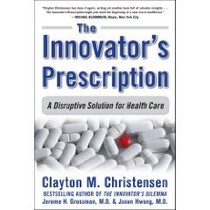Health records and the KISS of life


His new book, The Innovator's Prescription, dismissed the medical home concept in just a few sentences, noting it doesn't match well with current business models.
But there is a lot more to his book than that, as health economist Jane Sarasohn-Kahn pointed out recently on her blog, Health Populi.
There is, for instance, his endorsement of Personal Health Records as a "disruptive technology" capable of bringing enormous change.
What Sarasohn-Kahn points out is an important word to remember in relating this to PHRs. That word is simplicity. I call simplicity in this case the KISS of life, as in Keep It Simple Stupid.
How simple? Health workers in sub-Saharan Africa are now using PHR data, on mobile phones, to reduce the spread of HIV-AIDS. In some ways Ghana is ahead of the U.S.
Getting to a KISS state will take a lot more technical innovation than you encounter today at Google Health or Microsoft Healthvault.
What we're doing now is downloading a firehose of data to a complex form, and giving people a way to add to that by linking measuring devices to the form.
The result is a vast pool of data, under our control, but it leaves us no closer to answers.
An analogy can be made here to GPS.
GPS data, by itself, has very limited utility. To become truly useful it must be overlain on some application -- a city map, a list of coffee shops, an alert service for hikers. And that application must be transformed into action.
Once GPS data is turned into actionable information (turn left for the Starbucks) everyone starts to want it, and it transforms our life. Without those overlays, without that app, nothing much happens.
PHRs are the same way. The information on them must be turned into actionable information, and we need to be able to make use of it at a moment's notice, or it's just a block of data.
How do you do this?
- A reminder to take your pills.
- An alert when your blood pressure rises, or your sugar level falls.
- A report to the emergency team that finds you at an accident scene.
- Insert your health condition and what you want to know about it here.
It's only when data becomes an application, and an application results in action, that your life changes. This has happened repeatedly throughout this decade, often without our knowing it.
Remember a day before iPods, before Wikipedia, before WiFi? Well your kids don't.
When it happens with PHRs, it will be a revolution.